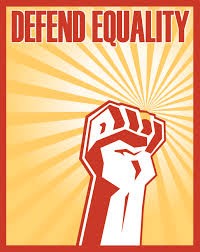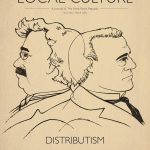Hidden Springs Lane. Rod Dreher has recently been pointing out (for example here) the various ways that those who voice public opposition to certain positions (especially gay marriage) are routinely denied their right to voice an opinion. The freedom to dissent is trumped by an unimpeachable orthodoxy, and to buck the orthodoxy is to incur the wrath of the faithful who seem all too willing to squelch the dissent.
Case in point is the removal of new Mozilla CEO Brendan Eich. It was recently made public that in 2008 Eich contributed $1,000 to support California’s Proposition 8 campaign against gay marriage. Guardian columnist Matt Andrews, expresses his absolutism in seemingly moderate terms.
An organisation should not be treated as a single homogeneous hivemind, with all employees sharing the same viewpoints. Diversity of belief and opinion is an important asset to a modern, innovative company. But issues of equality are more than just matters of conscience. These are the things that define us, our attitudes and our actions.
As we have all learned, Eich “voluntarily” stepped down. Here is the statement released from Mozilla:
Mozilla prides itself on being held to a different standard and, this past week, we didn’t live up to it. We know why people are hurt and angry, and they are right: it’s because we haven’t stayed true to ourselves. We didn’t act like you’d expect Mozilla to act. We didn’t move fast enough to engage with people once the controversy started. We’re sorry. We must do better. Brendan Eich has chosen to step down from his role as CEO. He’s made this decision for Mozilla and our community. Mozilla believes both in equality and freedom of speech. Equality is necessary for meaningful speech. And you need free speech to fight for equality. Figuring out how to stand for both at the same time can be hard. Our organizational culture reflects diversity and inclusiveness. We welcome contributions from everyone regardless of age, culture, ethnicity, gender, gender-identity, language, race, sexual orientation, geographical location and religious views. Mozilla supports equality for all.”
The key concept in both quotes is “equality.” Equality is the chief political and social value of our time. It is the conceptual lens by which most people see the moral and political world. If you don’t believe me consider the difficulty of championing hierarchy. Or running on the “I love aristocracy” platform. These would be seen by most as indicators of a serious social pathology.
Our love of equality is not new or surprising; although, the extent and degree may be. Writing in the 1830’s, Alexis de Tocqueville noted that a great revolution was taking place. This revolution consisted of a seismic shift from social structures characterized by hierarchy (aristocracy) to social conditions characterized above all else by equality. Two observations from Tocqueville help bring our current situation into focus. First, he writes: “When inequality is the common law of a society, the strongest inequalities do not strike the eye; when everything is nearly on a level, the least of them wound it. That is why the desire for equality always becomes more insatiable as equality is greater.”
Second: “I think that democratic peoples have a natural taste for freedom; left to themselves they seek it, they love it, and they will see themselves parted from it only with sorrow. But for equality they have an ardent, insatiable, eternal, invincible passion; they want equality in freedom, and, if they cannot get it, they still want it in slavery. They will tolerate poverty, enslavement, barbarism, but they will not tolerate aristocracy.”
We live at a time in history when equality of conditions is the ideal and, certainly in comparison to the vast sweep of history, we have achieved a level of social and political equality that is unprecedented. Consider what it means historically that all citizens over 18 years of age are eligible to vote. Consider the significance of the fact that anyone meeting a certain age requirement can hold political office. Slavery has been outlawed. Women have the franchise. On the social front, all citizens are free to travel and live where they will. Employment is open to those best suited to the position regardless of race or gender.
Before anyone chimes up with examples of unequal treatment, let me simply agree: there are plenty of lingering inequalities, most of them informal rather than legal. However, I am merely seeking to establish a point: social and political conditions today are far more equal than ever before. That, it seems to me, is simply irrefutable.
Tocqueville argues that as social conditions become more equal, the remaining inequalities will become increasingly irritating. People will become obsessed with equality, and their political and social lives will become increasingly focused on eradicating the last vestiges of inequality. In such a context, the least inequality will become an offense.
But, let’s consider one more feature of equality: it will never be achieved. (Some inequalities will always be with us, and it may be the case that some inequalities are beneficial. For instance, most would agree that some moral positions are superior to others. Even the champions of equality seem to argue that equality is not equal with inequality. Thus, they affirm the goodness of inequality even as they advocate equality.) If it is true that equality will never be fully realized, and if in an age of increasing equality inequalities will produce acute offense, then we should expect to see a society of perpetually offended citizens desperately chasing the elusive goal of equality. Indeed, the language of offense is the stock and trade of our time. Want to shut down a debate? Inform your opponent that what he or she says offends you. Offense is not rational, but in our age it is an effective trump.
Now let’s turn to what Tocqueville says about the relationship between freedom and equality. In ages of equality, people will naturally love freedom, but if freedom and equality ever come into conflict, people will choose equality at the expense of freedom. What is made painfully clear by the Eich case is something that should leave us all cold. The most fervent champions of equality appear to be quite willing to sacrifice freedom—at this point, the freedom of others—so long as they remain convinced that the elusive goal of equality is being advanced.
Perfect equality will never be achieved, but we have reached a stage in the “progress” of equality where inequalities animate with a religious zeal the very people most willing to exchange freedom (at least the freedom of other people) for the promise of the dream. They don’t yet realize that when freedom is compromised in such a fashion, it is only be a matter of time before the freedom of all is in jeopardy. As the Eich incident shows, a love for equality is even now eclipsing freedom.








16 comments
Laryy Sims
In his book,” Still the Best Hope: Why the World Needs American Values to Triumph”, Dennis Prager writes on the subject of “evil”. “It is necessary to define a term (evil) that should not need to be defined because a generation of Westerners has been taught that good and evil are subjective terms-that one man’s evil is another man’s good. In this morally confused modern world, evil needs to be defined.” Prager is saying to us that the obvious is sometimes the most difficult to prove. On the subject of homosexual marriage, a tradition (marriage) that has endured the test of time and cut across the lines of culture is now being debated within the context of “rights” (Constitutional or natural) and equity. The writings of Jefferson are even used to bolster the argument for the aberrant act of same sex “marriage”. If Jefferson were alive today, he might be perplexed by the question and agree with Praeger’s assessment of a “morally confused society.”
Ed Ludwig-Krause
“When I contemplate the immense advances in science and discoveries in the arts which have been made within the period of my life, I look forward with confidence to equal advances by the present generation, and have no doubt they will consequently be as much wiser than we have been as we than our fathers were, and they than the burners of witches.” — Thomas Jefferson to Benjamin Waterhouse, 1818 March 3
Larry, science is showing us that what is “natural” is not so easily defined:
http://newswatch.nationalgeographic.com/2009/06/16/same-sex_behavior_common_in_animals/
http://io9.com/5967426/scientists-confirm-that-homosexuality-is-not-genetic–but-it-arises-in-the-womb
http://www.the-scientist.com/?articles.view/articleNo/33773/title/Can-Epigenetics-Explain-Homosexuality-/
Nature is full of variety, inconsistencies (aberrant?) that are much more complex than our dim understanding. As science has expanded (and continues to expand) our collective wisdom, customs and politics, those previously considered second class citizens (or non-citizens) have had their rights recognized, not constricted. Our mistaken assumptions about racial superiority and the rights of women have changed, albeit with much controversy and struggle. Likewise, the “naturalness” of homosexuality for a percentage of people in our human family is now better understood and, naturally, the rights of this minority are being recognized, also not without controversy.
~ Is it “evil” or “good” to be more rigidly loyal to an ideology than to facts and a broader understanding of the universe and a human beings place in it?
~ Was it “evil” or “good” for the church to imprison the elderly Galileo for publishing his scientific discovery (and not apologize for over 400 years), for shining a light into the darkness of human understanding about planetary motion, disproving church dogma?
~ Was it “evil” or “good'” to invade Iraq under false pretenses, to torture human beings, to cause the slaughter of hundreds of thousands of civilians (and to spend $trillions doing it) under the guise of nonexistent WMD’s and the export of “American Values”. Should Bush, Cheney and Rumsfeld (all unrepentant) be living in opulent retirement or be in prison for crimes against humanity?
As many of us yearn for simple answers to complex questions in an infinite universe, many of us yearn for easy definitions of good and evil. Though I trust Mr. Prager’s intentions are good, it is becoming clear he is on the wrong side of science (our understanding of God’s creation, if you like) and history. (Please remind me, what is that aphorism about the path to hell and good intentions?)
“Ignorance is preferable to error, and he is less remote from the truth who believes nothing than he who believes what is wrong.” -Thomas Jefferson (Notes on Virginia, 1782)
Laryy Sims
Hidden Springs Lane. Rod Dreher has recently been pointing out (for example here) the various ways that those who voice public opposition to certain positions (especially gay marriage) are routinely denied their right to voice an opinion. The freedom to dissent is trumped by an unimpeachable orthodoxy, and to buck the orthodoxy is to incur the wrath of the faithful who seem all too willing to squelch the dissent.
Apparently, you are intolerant of “dissenting views”, and choose to use traditional labels to discount the dissenter.
First you imply that because I adhere to the tradition of marriage as being between a man and a woman, I ignore the advances of science. The science of childbirth and propagation of the species underscores the natural act of the man woman thing. Since you cherry picked Thomas Jefferson quotes, please allow me to respond in kind. “the separate and equal station to which the Laws of Nature and of Nature’s God entitle them, a decent respect to the opinions of mankind requires that they should declare the causes which impel them to the separation.” On which side of the same sex marriage argument does this place Jefferson? Probably neither. The name of this great man has been used to defend many diverse positions, but is doubtful he would have weighed in on this argument. He might have been amazed that there was a debate.
Next, because I and millions of others do not assign moral equivalence to a relationship between two members of the same sex and a legally, socially, and religiously sanctioned marriage somehow puts us in the position of denying rights to others. States and communities have rights as well. Please correct me if I am wrong, but I believe the Tenth Amendment is still part of the Constitution, and spare me the slavery argument. States rights is not equal to racism, which brings me to your next argument. The struggle for racial and gender equality runs parallel to the “right” of same sex couples to marry. The noble effort of racial minorities and women to gain equal status is diminished by this comparison.
Of course, we must bring God and the Church into the argument. I am a Southern Baptist, and we are proud of our Anabaptist tradition based on individualism and a one on one relationship with God. The reason we are able to refer to Jefferson and Madison as President was because of the political support from the followers of Roger Williams, and rightly so. Both men defended the early Baptists from persecution at the hands of a staunch communitarian state supported establishment. By the way, we did not “burn witches.”
Thanks for reminding me that this is George Bush’s fault. This discussion would not be complete without that gem of wisdom. There are dead Syrians who would disagree with “the guise of nonexistent WMD’s.” What did Sadam do with all those chemical weapons?”
Finally, the “I” word. “Ignorance is preferable to error, and he is less remote from the truth who believes nothing than he who believes what is wrong.” -Thomas Jefferson (Notes on Virginia, 1782). Jefferson respected the opinions of man: the “Laws of Nature and of Nature’s God entitle them, a decent respect to the opinions of mankind.” Jefferson was a stubborn guy. He always ended a discussion with the freedom of independent thought, and was not condescending.
Which brings us back to the beginning: “The freedom to dissent is trumped by an unimpeachable orthodoxy, and to buck the orthodoxy is to incur the wrath of the faithful who seem all too willing to squelch the dissent.”
Rob G
“Second class citizens are quite capable of identifying themselves and will usually join others who believe their secondary status is unjust… working together to end said injustice.”
That explains why there’s so much advocacy in government and the media for, say, the rural white poor or the disenfranchised/displaced small farmer.
JimWilton
Interesting to see a article in Front Porch Republic advocating tolerance as an ideal.
I think, however, that the tension you posit between equality and freedom is based on a misunderstanding. Free speech is achieved when government stays out of the debate. After that, the benefits of free speech depend on the ability of private citizens to be able to advocate forcefully if the situation calls for it. This includes the right to ridicule or to shout down a person who trivializes the humanity of others or who argues for dangerous or repulsive ideas. With the current debate over gay marriage and gay rights, what we are confronting is a stark contrast — a growing majority that views anti-gay advocates as bigots not worthy of participation in a civil debate in the same way that an advocate of slavery or anti-midcegenation laws would today be viewed as a racist with manifestly repugnant views.
The minority, of course, disagrees and would like to have their views acknowledged as being in a range of what is socially acceptable.
This is the type of disagreement that will be sorted out in due course. Appeals to tolerance simply seek to take the edge off the issue by undercutting one of the majority’s strongest arguments — that homosexuality is an intrinsic human characteristic, that to attack the characteristic is to attack person, and that to attack the person is a position that should not be tolerated.
Ed Ludwig-Krause
Second class citizens are quite capable of identifying themselves and will usually join others who believe their secondary status is unjust… working together to end said injustice.
Rob G
“How does this relate to the ideal of equal rights for those who have been treated as second class citizens?”
Identity politics assumes an elite, anointed class who have to serve as the identifiers. By throwing various bones to the correct second class citizen groups they gain support that in time translates to power and money.
Ed Ludwig-Krause
I meant to address Rob, not Roger.
Ed Ludwig-Krause
Roger,
How does this relate to the ideal of equal rights for those who have been treated as second class citizens?
Rob G
” it is the concentrated power distracting the Boobosie in order to forward their malign interests of increasingly consolidated power, regardless of the grab-bag of identity issues they trot out with a full range of emotion.”
Exactly. Get in power, stay in power, run the country the way you think it should be run and, as an aside, make lots of money in the process. It’s all about control — the rest is gingerbread and frippery.
D.W. Sabin
E. L-K
Well, obviously , it is the concentrated power distracting the Boobosie in order to forward their malign interests of increasingly consolidated power, regardless of the grab-bag of identity issues they trot out with a full range of emotion.
Ed Ludwig-Krause
Ohhh… of course! Obviously! An incognito communist conspiracy!
I was duped into thinking it was about “equal” protection under the law.
Ed Ludwig-Krause
D.W.,
Please kindly enlighten me as to the “entirely different agenda”.
D.W. Sabin
Just as “Patriotism” was not wrongly referred to as “the last bastion of a scoundrel”, so too is “Equality” frequently used as a cover for eroding freedom and equality. Both sentiments have their place but in the context of this noisome, prevaricating and dissembling culture, they are banners hoisted all too frequently by those with an entirely different agenda. They are a handy distraction, a pretty parade for the boobosie. After the floats and bands have done their magic, the garbage must be cleaned up.
Nobody likes to talk about the garbage however. It is too much of a bummer.
Roger
The Cathedral (http://occamsrazormag.wordpress.com/2013/06/11/the-laws-of-the-cathedral-obey-or-perish/) will burn at the stake anyone questioning divine gifts of equality and diversity.
Ed Ludwig-Krause
We live in a world constantly be-coming. A work in progress. Perfect equality does not exist in this mortal coil; perfect freedom neither. Both equality and freedom (as the founders wrote them with political compromise) were ideals at the core of this American experiment from the get-go. They, and we, are working toward a “more perfect union” in a perpetual mix of idealism and realpolitik. So, yes, a state of “perpetual offense.” We can always do better, can’t we?
“Of liberty I would say that, in the whole plenitude of its extent, it is unobstructed action according to our will. But rightful liberty is unobstructed action according to our will within limits drawn around us by the equal rights of others. I do not add ‘within the limits of the law,’ because law is often but the tyrant’s will, and always so when it violates the right of an individual.” –Thomas Jefferson to Isaac H. Tiffany, 1819.
Jefferson, were he alive today, would likely say Eich’s liberty (or, “freedom” if you prefer) to help fund the passage of a law violating the right of an individual to marry (and to pursue happiness) went beyond the limits drawn around him (and us) by the equal rights of others.
Perhaps, Jefferson would today also marry a “free” Sally Hemings and quit living a life of embodied hypocrisy.
Comments are closed.